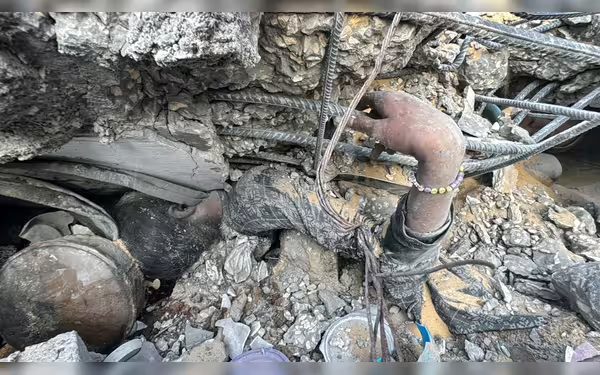Saturday, November 16, 2024 05:53 PM
Gaza Food Crisis: Palestinians Struggle Amid Destruction
- Severe food shortages plague northern Gaza residents.
- Families scavenge through rubble for basic necessities.
- International community urged to provide urgent humanitarian aid.
 Image Credits: arabnewspk
Image Credits: arabnewspkTens of thousands of Palestinians in northern Gaza face severe food shortages amid ongoing destruction and humanitarian crisis.
In recent weeks, the humanitarian crisis in northern Gaza has reached alarming levels, as tens of thousands of Palestinians face severe food shortages due to an ongoing Israeli siege. With virtually no food allowed into the region for over a month, families are left to ration their last supplies of lentils and flour, desperately searching for sustenance amidst the rubble of their destroyed homes.
As bombardments continue to shake the area, many brave individuals risk their lives to venture out in search of food. Reports indicate that thousands have fled to Gaza City, where conditions are slightly better, yet still dire. Hospitals are overwhelmed, with thousands of children suffering from malnutrition. One nutritionist recounted the heartbreaking case of a pregnant woman weighing only 40 kilograms (88 pounds), highlighting the severe impact of the ongoing crisis.
Mohammed Arqouq, a resident determined to stay in northern Gaza with his family of eight, expressed the despair felt by many: "We are being starved to force us to leave our homes. We will die here in our homes." Medical professionals warn that the situation is deteriorating rapidly, with hunger levels spiraling under the month-long siege imposed by the Israeli military, which has intensified its operations since early October.
The Israeli military has established checkpoints throughout the area, urging residents to evacuate. Many Palestinians fear that Israel's long-term goal is to depopulate northern Gaza. Experts monitoring food security have warned that famine is imminent, with some suggesting it may already be occurring.
The urgency of the situation is compounded by a looming deadline for the Biden administration's request to Israel to increase humanitarian assistance into Gaza. The U.S. has stipulated that a minimum of 350 trucks carrying food and supplies must be allowed daily, yet Israel has consistently fallen short of this target. In October, an average of only 57 trucks entered Gaza each day, and this number increased slightly to 81 in the first week of November. The United Nations reports an even lower figure, with only 37 trucks making it through daily since early October.
Despite some progress, such as the opening of a new crossing into central Gaza, U.S. State Department officials emphasize that more must be done. "It’s not just sufficient to open new roads if more humanitarian assistance isn’t going through those roads," stated a spokesperson.
As Israeli forces continue to bombard towns like Beit Lahiya, Beit Hanoun, and Jabaliya refugee camp, the struggle for food and safety intensifies. Witnesses describe a desperate daily search for basic necessities, with families scavenging through bombed-out buildings. Arqouq shared his experience of searching at night, stating, "Sometimes you find a half-empty package of flour, canned food, and lentils." The situation is so dire that Um Saber, a widow, likened their plight to that of "dogs and cats searching for their food in the rubble."
Families are forced to share meager supplies, with many relying on the kindness of others. Ahmed Abu Awda, a father of three, explained that his family’s daily meal consists of lentils and bread, carefully rationed to ensure the children eat. Lubna, a mother of five, recounted how her family had to flee their home, leaving food behind as they escaped the violence. Her husband now scavenges for flour from destroyed homes, but the supplies are often moldy and require sifting before use.
The ongoing offensive has raised fears among Palestinians that Israel aims to empty northern Gaza, with reports of troops going door-to-door, forcing residents to evacuate towards Gaza City. The UN estimates that around 14,000 displaced Palestinians are currently sheltering in the city, where food and supplies are also running low.
Dr. Rana Soboh, a nutrition specialist, reports seeing hundreds of cases of acute malnutrition daily, with many patients struggling to concentrate and showing visible signs of distress. The situation is heartbreaking, as families grapple with the harsh realities of hunger and displacement.
As the crisis unfolds, it is crucial for the international community to pay attention and advocate for the urgent need for humanitarian assistance in Gaza. The resilience of the Palestinian people in the face of such adversity is commendable, yet the need for immediate action to alleviate their suffering cannot be overstated. The world must not turn a blind eye to the plight of those who are enduring unimaginable hardships in their quest for survival.













